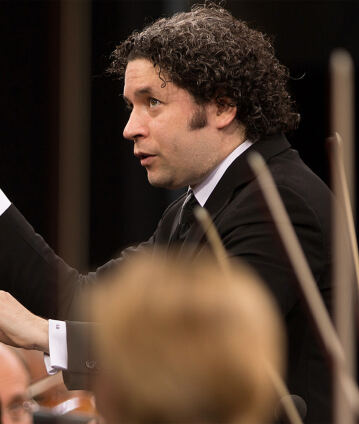Gustavo Dudamel conducts Tchaikovsky and Brahms at the Waldbühne

At his second Waldbühne Concert Gustavo Dudamel marked the 450th anniversary of Shakespeare’s birth by conducting two works by Tchaikovsky: his popular fantasy overture Romeo and Juliet and his symphonic fantasy on The Tempest, a work far too infrequently heard. After the interval came a cornerstone of the late Romantic German repertory: Brahms’s First Symphony.
The young Venezuelan maestro has always felt a very special affinity for Tchaikovsky’s music since it has from the outset been a regular feature of the programmes of the El Sistema youth orchestras with which Dudamel grew up: “If you want to engage the attention of kids who have never heard classical music, then you should try Tchaikovsky. His compositions develop in a clear and easily understandable way and conjure up the same sort of vivid images as ballet music.” The two works on this evening’s programme likewise evoke particular images in their listeners’ minds: the story of the way in which Shakespeare’s star-crossed lovers are destroyed by the irreconcilable hatred of their two warring families finds expression in one of the most famous melodies in the whole of classical music, while in The Tempest the sea becomes the defining element in creating the atmosphere on Prospero’s enchanted island.
After the interval came Brahms’s First Symphony, a work that the composer completed only after years of effort but which finally found him breaking free from Beethoven’s intimidating influence. In the opinion of the Berliner Morgenpost the combination of Russian and German Romanticism proved particularly felicitous, since Dudamel “declared Brahms and Tchaikovsky to be musical blood-brothers and turned the former composer’s First Symphony into four symphonic tableaus animated by thrilling restlessness and luxurious cinemascope emotions.” And the critic of Der Tagesspiegel was excited by the “musical sparks that were struck when Latin American fire and carefree youth encountered a highly refined body of players. The air above Berlin was no longer filled with the smell of local beer but bubbled like champagne.”
© 2014 EuroArts Music International
Category
Artists
Our recommendations
- Gustavo Dudamel conducts Wagner and Schumann at the Waldbühne
- A “Latin American Night” at the Waldbühne with Daniel Barenboim
- “World Encores” with Mariss Jansons and Vadim Repin at the Waldbühne
- James Levine conducts Wagner and Strauss at the Waldbühne
- A “St Petersburg Night” with Daniel Barenboim and Zubin Mehta at the Waldbühne
- Georges Prêtre conducts “A French Night” at the Waldbühne